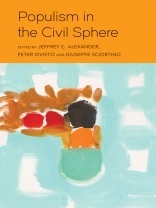Even as the specter of populism haunts contemporary societies, scholars have not been able to agree about what it is. Except for one thing: a deviation from democracy, the source, it seems, of the precarious position in which so many societies find themselves today. This volume aims to break the Gordian knot of ‘populism’ by bringing a new social theory to bear and, in so doing so, suggesting that normative judgments about this misunderstood phenomenon need to be reconsidered as well. Populism is not a democratic deviation but a naturally occurring dimension of civil sphere dynamics, fatal to democracy only at the extremes.
Because populism is highly polarizing, it has the effect of inducing anxiety that civil solidarity is breaking apart. Left populists feel as if civil solidarity is an illusion, that democratic discourse is a fig leaf for private interests, and that the social and cultural differentiation that vouchsafes the independence of the civil sphere merely reflects the hegemony of narrow professional interests or those of a ruling class. Right populists share the same distrust, even repulsion, for the civil sphere. What seems civil to the center and left, like affirmative action or open immigration, they call out as particularistic; honored civil icons, such as Holocaust memorials, they trash. How can the sense of a vital civil center survive such censure from populism on the left and the right?
Populism in the Civil Sphere provides compelling answers to these fundamental questions. Its contributions are both sophisticated theoretical interventions and deeply researched empirical studies, and it will be of great interest to anyone concerned about the most important political developments of our time.
विषयसूची
List of Contributors
List of Figures
List of Tables
Preface and Acknowledgements
Introduction
The Populist Continuum from within the Civil Sphere to Outside It
Jeffrey C. Alexander
Chapter 1
Populism’s Cultural and Civil Dynamics
Marcus Morgan
Chapter 2
#Disente and Duterte: The Cultural Bases of Antipopulism in the Philippines, 2001-2019
Celso M. Villegas
Chapter 3
Uncivil Populism in Power: The Case of Erdoganism
Ates Altinordu
Chapter 4
The Populist Transition and the Civil Sphere in Mexico
Nelson Arteaga Botello
Chapter 5
Far-Right Populism in Poland and the Construction of a Pseudocivil Sphere
María Luengo and Malgorzata Kolankowska
Chapter 6
The ‘Thirteenth Immigrant’? Migration and Populism in the 2018 Czech Presidential Election
Bernadette Nadya Jaworsky
Chapter 7
Memory Culture, Civil Sphere and Right-Wing Populism in Germany – The Resistible Rise of the Alternative für Deutschland (Af D)
Werner Binder
Chapter 8
Populism and the Particularization of Solidarity: On the Sweden Democrats
Henrik Enroth
Chapter 9
Left-Populism in a Communist Civil Sphere: The Lesson of Bo Xilai
Andrew Junker
Chapter 10
A Civil Sphere Theory of Populism: American Forms and Templates, from the Red Scare to Donald Trump
Jason L Mast
Commentary
Demarcating Constructive from Destructive Populisms: Civil Translation vs. Civil Mimicry
Carlo Tognato
Conclusion
Is Populism the Shadow of the Civil?
Peter Kivisto and Giuseppe Sciortino
Index
लेखक के बारे में
Jeffrey C. Alexander is Lillian Chavenson Saden Professor of Sociology at Yale University.
Peter Kivisto is Richard Swanson Professor of Social Thought and Chair of Sociology at Augustana College.
Giuseppe Sciortino is Professor of Sociology and Social Research at the University of Trento.












